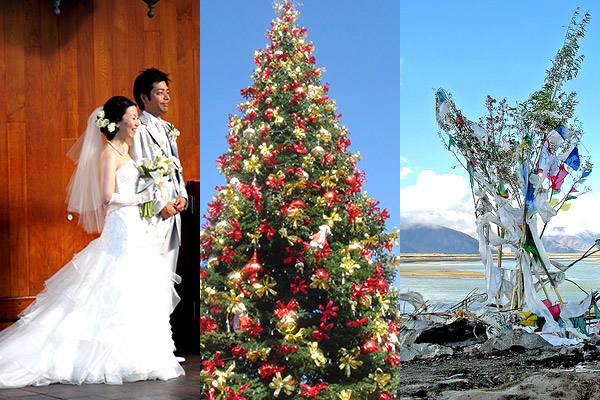
Multireligious Japanese: Many Practice Celebrations of Several Religions, Not Just One
- By Alison Lesley --
- 09 Jul 2015 --

Although worshipping is no longer a significant part of daily living in Japan, Japanese individuals practice rituals from a mixture of religions.
Japan is one of the world’s top tourist destinations because of its beauty, economy, technology, friendly people, interesting history, traditions, and religions. And when talking about religion, did you know that Japan is also a melting pot of different beliefs in Asia?
All the major religions you know from Christianity, Buddhism, Islam, Hinduism, Judaism, Taoism, and up to Japan’s very own Shinto are present here. Even the minor and smaller faiths are also well-represented in the “Land of The Rising Sun”.
But if you have the opportunity to visit Japan and get to know the local people, you will notice that the Japanese are really not that religious amidst the presence of several religions and beliefs. Compared to all other countries where you will see Christians, Islams, Hindus, Jews, or Buddhists who are very devoted and passionate about their respective religions, the majority of the Japanese population could not be considered as devoted. In fact, the Japanese society and the government is not even pushing Shinto or any specific faith.
In Japan, it’s common to see individuals who participate in a mixture of practices from different religions. For example; one person’s birth rituals can be done in the Shinto way, their baptismal and weddings the Christian way, and their death ceremonies through the Buddhist traditions.
Japanese experts explain that religion is no longer a significant part of daily living in the country today. Instead, the Japanese are more interested in participating or observing the rituals, ceremonies, and specific activities of religions. Certain rituals like Christian weddings, Christmas, Chinese New Year, Halloween, Buddhist festival of the dead, etc are all celebrated in the country regardless of religion. In fact, the Yuletide Season is a big celebration even for the Shinto and Shinto priests.
The trend of people becoming less religious started after World War II. Experts point out that the changes have been brought about by the very dynamic and adaptive nature of Japan. As western influences on food, fashion, customs, including religion have reached the country, the Japanese people have welcomed and adapted to them. There are even things popularly associated with Japan but in reality, did not originate from this country. A good example is the tempura dish, commonly thought to be Japanese, which is originally Portuguese.
Japan’s major and oldest religion is Shinto. The religion in itself practices belief in multiple gods and much of its teaching are intertwined with nature and the elements like the wind, water, and the sun. Children being born may undergo Shinto birth rites, but as they grow and already able to discern, they are free to choose or follow any religion or in Japan’s case, observe any ceremony, ritual, or celebration.


















